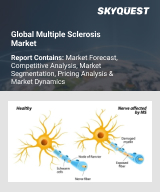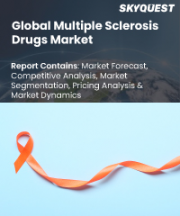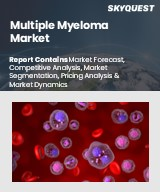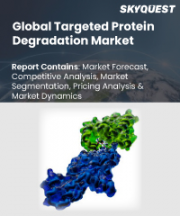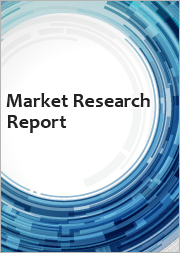
|
시장보고서
상품코드
1439970
면역조절제 시장 : 시장 인사이트, 경쟁 환경 및 시장 전망(2030년)Immunomodulators - Market Insights, Competitive Landscape, and Market Forecast - 2030 |
||||||
세계 면역조절제 시장 규모는 2024년부터 2030년까지 예측 기간 동안 5.19%의 연평균 복합 성장률(CAGR)로 확대될 것으로 예상됩니다. 면역조절제에 대한 수요는 주로 천식, 알레르기 질환, 암, 다발성 경화증과 같은 다양한 만성 질환 증가에 의해 촉진되고 있습니다. 또한, 다발성 경화증 치료에서 포네시모드, 오자니모드, 라키니모드 등 면역치료제 개발 임상시험의 급증, 약물 전달 기술의 발전, 크론병 치료에서 초기 면역조절제 치료의 채택 증가, 류마티스 관절염 등 면역질환 치료에 대한 미충족 수요 증가로 인해 면역조절제에 대한 수요는 지속적으로 증가할 전망입니다. 류마티스 관절염과 같은 면역질환 치료에 대한 높은 미충족 수요, 약물 출시 및 승인 증가 등이 2024-2030년의 예측 기간 동안 전체 면역조절제 시장의 성장에 기여하고 있습니다.
면역조절제 시장은 다양한 요인으로 인해 제품 수요가 증가하고 있으며, 그 주요 요인 중 하나는 전 세계적으로 만성질환이 증가하고 있다는 점입니다. 미국암협회(American Cancer Society)의 최근 조사에 따르면, 2040년까지 인구 증가와 고령화로 인해 전 세계 암 환자 수는 2,750만 명, 암 사망자 수는 1,630만 명에 달할 것으로 추산됩니다. 경제적으로 전환하는 국가에서는 흡연, 건강에 해로운 식습관, 운동 부족, 출산율 감소 등 위험을 증가시키는 요인이 점점 더 만연하고 있기 때문에 향후 부담은 더욱 커질 것으로 보입니다. 면역조절제는 주로 다발성 골수종 및 기타 여러 암을 치료하는 경로를 표적으로 삼는 약물 그룹입니다. 이 약물들은 특정 단백질을 감소시키고 다른 단백질을 증가시킴으로써 면역체계에 직접 작용하는 등 다양한 방식으로 작용합니다. 따라서 암 발병률 증가는 향후 몇 년동안 면역조절제에 대한 수요를 증가시킬 것으로 예상됩니다.
이 보고서는 세계 면역조절제 시장을 조사했으며, 시장 개요와 함께 유형별/적응증별/지역별 동향, 시장 진출기업 프로파일 등의 정보를 제공합니다.
목차
제1장 면역조절제 시장 보고서 서론
제2장 면역조절제 시장 주요 요약
제3장 규제 분석
- 미국
- 유럽
- 일본
- 중국
제4장 면역조절제 시장의 주요 요인 분석
- 면역조절제 시장 성장 촉진요인
- 면역조절제 시장 성장 억제요인과 과제
- 면역조절제 시장 기회
제5장 면역조절제 시장 : Porter의 Five Forces 분석
제6장 면역조절제 시장 개요
- 유형별
- 적응증별
- 지역별
제7장 면역조절제 시장 기업과 제품 개요
- Pfizer Inc.
- Petrovax
- Acrotech Biopharma, Inc.
- Astellas Pharma Inc.
- Horizon Therapeutics plc
- Sun Pharmaceutical Industries Ltd.
- Merck & Co., Inc.
- Biocon
- Bristol-Myers Squibb Company
- Teva Pharmaceuticals
- Zydus Pharmaceuticals, Inc.
- F. Hoffmann-La Roche Ltd
- Amgen Inc.
- Johnson & Johnson Services, Inc
- Lilly
제8장 KOL(Key Opinion Leader)의 견해
제9장 프로젝트 접근
제10장 DelveInsight에 대해
제11장 면책사항과 문의
LSH 24.03.29Immunomodulators Market By Type (Immunosuppressants And Immunostimulants), Indication (Cancer, Respiratory, HIV, And Others), and geography is expected to grow at a steady cagr forecast till 2030 owing to the rising prevalence of chronic diseases and the increase in adoption of early immunomodulator therapy
The global immunomodulators market is estimated to grow at a CAGR of 5.19% during the forecast period from 2024 to 2030. The demand for immunomodulators is primarily being boosted by the increasing figures of various chronic diseases such as asthma, allergic conditions, cancer, multiple sclerosis, and others, worldwide. In addition, a surging number of ongoing clinical trials for the development of immunotherapeutic agents, such as ponesimod, ozanimod, and laquinimod, in the treatment of multiple sclerosis, advancements in drug delivery technologies, rising adoption of an early immunomodulator therapy for the treatment of Crohn's disease, the presence of the high unmet clinical needs about treatment for immune disorders, such as rheumatoid arthritis, the increasing drugs launches and approval among others are thereby contributing to the overall growth of the immunomodulators market during the forecast period from 2024-2030.
Immunomodulators Market Dynamics:
The immunomodulators market is witnessing a growth in product demand owing to various factors, one of the key factors being the increasing number of chronic diseases across the globe. As per the latest study done by the American Cancer Society, it is estimated that by 2040, the global burden of cancer is expected to grow to 27.5 million new cancer cases and 16.3 million cancer deaths simply due to the growth and aging of the population. The future burden will probably be even larger due to the increasing prevalence of factors that increases risk, such as smoking, unhealthy diet, physical inactivity, and fewer childbirths, in economically transitioning countries. Immunomodulators are a group of drugs that mainly target the pathways that treat multiple myeloma and a few other cancers. They have many ways to work, including working on the immune system directly by turning down some proteins and turning up others. Thus, the increasing incidence of cancer will increase the demand for immunomodulators in the upcoming years.
Further, according to MSIF 2020 report, 2.8 million people were living with multiple sclerosis (MS) in 2020, around the globe. Immunomodulators or receptor modulators are indicated for the treatment of patients with relapsing forms of MS. They help to slow the accumulation of physical disability and decrease the frequency of clinical exacerbations. Thus, the increasing prevalence of MS will increase the demand for immunomodulators in the market.
The element driving the rise of this vertical is also the existence of high unmet clinical needs concerning the treatment of immunological illnesses, such as rheumatoid arthritis. Because of their decreased risk of side effects when compared to other available medications, these immunotherapies are anticipated to become more popular in the upcoming years. Due to the limited options, which are limited to TNF inhibitors, there is an increasing demand for alternative treatments for rheumatoid arthritis, which is anticipated to create attractive growth possibilities for this industry.
Further, rising strategic activities will also create a positive impact on the growth of the market. For instance, in March 2022, Themis Medicare Ltd., a pharmaceutical company headquartered in Mumbai, announced the approval of its antiviral drug VIRALEX® by the Drug Controller General of India (DCGI). VIRALEX® is an immunomodulatory agent with broad-spectrum antiviral properties. It enhances both innate & adaptive immunity and strengthens the body's defense response to viral infections. Therefore, the above-mentioned factors are contributing to the growth of the immunomodulators market during the forecast period from 2024-2030.
However, side effects related to drugs, stringent regulatory framework, and others may restrict the immunomodulators market growth.
Immunomodulators Market Segment Analysis:
Immunomodulators market by Type (Immunosuppressants and Immunostimulants), Indication (Cancer, Respiratory, HIV, and Others), and Geography (North America, Europe, Asia-Pacific, and the Rest of the World)
In the drug type segment of the immunomodulators market, the immunosuppressants category is expected to amass a significant revenue share in the year 2023. This can be ascribed to the advantages and applications associated with the segment.
Immunosuppressive drugs, often known as immunosuppressive agents, are medications that inhibit or block immune system activation. It can reduce the high reactivity of the immune system which is causing auto-immune diseases and other chronic disorders.
These drugs prevent the rejection of transplanted organs and tissues, and treat autoimmune diseases or diseases that are most likely of autoimmune origin such as rheumatoid arthritis, multiple sclerosis, myasthenia gravis, systemic lupus erythematosus, sarcoidosis, focal segmental glomerulosclerosis, Crohn's disease, Behcet's Disease, pemphigus, and ulcerative colitis, and treat some other non-autoimmune inflammatory diseases such as long term allergic asthma control.
The increasing number of cases of cancers will also increase the demand for immunosuppressant drugs. For instance, as per GLOBOCAN 2021, in 2020, nearly 1,324,413 new cases of cancer were reported in India. Rapalogs, a family of immunosuppressive drugs including rapamycin (sirolimus), everolimus, temsirolimus, and deforolimus are indicated for the treatment of various malignancies. Thus, the increasing figures for cancers will increase the demand for immunosuppressants in the market.
Further, the increasing product launches, approvals, and other strategic activities on immunosuppressant drugs will drive the market of the segment. For instance, in November 2020, Lupin launched generic immunosuppressant Tacrolimus capsules in the American market after its alliance partner Concord Biotech received approval for the product from the US health regulator. The company has launched Tacrolimus capsules USP in the strengths of 0.5 mg, 1 mg, and 5 mg after Concord Biotech received approval for its abbreviated new drug application (ANDA) from the United States Food and Drug Administration (US FDA),
Therefore, the advantages and applications offered by immunosuppressants are predicted to contribute to the increasing demand for this segment thereby driving the growth of the overall immunomodulators market during the forecast period.
North America is expected to dominate the Overall Immunomodulators Market:
Among all the regions, North America is estimated to account for the largest share of the Immunomodulators market in the year 2023. Owing to factors such as the upsurge in the aging population susceptible to autoimmune disorders, a surging population base suffering from chronic diseases such as asthma, allergic conditions, cancer, multiple sclerosis, and others, and the presence of key players in the region, is expected to aid in the growth of the North America Immunomodulators market. Furthermore, high disposable income, sophisticated healthcare infrastructure, and regulatory approval for new drugs, also helped the market growth in this region.
According to a report published by the National Multiple Sclerosis Society (2023), in 2020, more than 1 million people suffering from multiple sclerosis resided in the United States. Immunomodulatory drugs for multiple sclerosis (MS) control autoimmune damage to the central nervous system (CNS) by reducing immune cell numbers, altering their function, or blocking their access to the brain and spinal cord. Thus, the increasing figures of such autoimmune diseases in the region will increase the demand for immunomodulatory drugs, thereby propelling the market of immunomodulatory in North America.
Coupled with the factors mentioned above, strategic activities such as product launches and approvals, mergers, acquisitions, partnerships, and others also help in boosting regional product demand. For instance, in November 2022, Provention Bio, Inc., received Biologics License Application (BLA) approval from FDA for TZIELD (teplizumab-mzwv), an anti-CD3-directed antibody, for intravenous use, as the first and only immunomodulatory treatment to delay the onset of Stage 3 T1D in adult and pediatric patients aged 8 years and older with stage 2 T1D.
Also, in August 2019, AbbVie announced that the US FDA approved RINVOQ(TM) (upadacitinib), a 15 mg, once-daily oral Janus kinase (JAK) inhibitor, for the treatment of adults with moderately to severely active rheumatoid arthritis (RA). RINVOQ is a targeted immunomodulator (TIM) therapy. Thus, such strategic steps help to increase the demand for Immunomodulators, thereby driving the North America immunomodulators market forward during the forecast period.
Immunomodulators Market Key Players:
Some of the key market players operating in the Immunomodulators market include Pfizer Inc., Petrovax, Acrotech Biopharma, Inc., Astellas Pharma Inc., Horizon Therapeutics plc, Sun Pharmaceutical Industries Ltd., Merck & Co., Inc., Biocon, Bristol-Myers Squibb Company, Teva Pharmaceuticals, Zydus Pharmaceuticals, Inc., F. Hoffmann-La Roche Ltd, Amgen Inc., Johnson & Johnson Services, Inc., Lilly., and others.
Recent Developmental Activities in the Immunomodulators Market:
In April 2023, The UK's Medicines and Healthcare Products Regulatory Agency (MHRA) granted ADvantage Therapeutics' immunotherapy AD04 an Innovation Passport for the treatment of Alzheimer's disease. The designation, under the regulator's Innovative Licensing and Access Pathway (ILAP), will fast-track a potential route to market for AD04 by providing collaborative opportunities with UK institutes like the National Institute for Health and Care Excellence (Nice).
In October 2019, Pandion Therapeutics, Inc., and Astellas Pharma Inc., signed a license and collaboration agreement directed toward the research, development, and commercialization of locally acting immunomodulators for autoimmune diseases of the pancreas.
In January 2019, KYORIN Holdings, Inc., announced that its wholly-owned subsidiary KYORIN Pharmaceutical Co., Ltd. entered into a collaboration and license agreement with aTyr Pharma, Inc., for Japan about ATYR1923, aTyr's novel immunomodulator. The agreement grants Kyorin an exclusive license to develop and commercialize ATYR1923 for interstitial lung diseases in Japan.
Key Takeaways from the Immunomodulators Market Report Study
Market size analysis for current immunomodulators market size (2023), and market forecast for 5 years (2024-2030)
The effect of the COVID-19 pandemic on this market is significant. To capture and analyze suitable indicators, our experts are closely watching the immunomodulator market.
Top key product/services/technology developments, mergers, acquisitions, partnerships, and joint ventures happened for the last 3 years
Key companies dominating the global immunomodulators market.
Various opportunities available for the other competitor in the immunomodulators market space.
What are the top-performing segments in 2023? How these segments will perform in 2030.
Which are the top-performing regions and countries in the current immunomodulators market scenario?
Which are the regions and countries where companies should have concentrated on opportunities for immunomodulators market growth in the coming future?
Target Audience who can be benefited from this Immunomodulators Market Report Study
Immunomodulators products providers
Research organizations and consulting companies
Immunomodulators-related organizations, associations, forums, and other alliances
Government and corporate offices
Start-up companies, venture capitalists, and private equity firms
Distributors and Traders dealing in immunomodulators
Various End-users who want to know more about the immunomodulators market and the latest technological developments in the immunomodulators market.
Frequently Asked Questions for the Immunomodulators Market:
1. What are immunomodulators?
Immunomodulators are agents that can enable the body to fight cancer, infection, or other disorders by stimulating or suppressing the immune system.
2. What is the market for global immunomodulators?
The global immunomodulators market is estimated to grow at a CAGR of 5.19% during the forecast period from 2024 to 2030.
3. What are the drivers for the global Immunomodulators market?
The demand for immunomodulators is primarily being heightened by the increasing incidence of chronic diseases including asthma, cancer, allergic conditions, multiple sclerosis, and other chronic diseases. In addition, increasing adoption of early immunomodulator therapy for the treatment of Crohn's disease, the presence of high unmet clinical needs about treatment for immune disorders, the availability of generic immunomodulators, and increasing drug launches and approvals, among others, thereby contribute to the overall growth of the immunomodulators market during the forecast period from 2024-2030.
4. Who are the key players operating in the global immunomodulators market?
Some of the key market players operating in the immunomodulators market include Pfizer Inc., Petrovax, Acrotech Biopharma, Inc., Astellas Pharma Inc., Horizon Therapeutics plc, Sun Pharmaceutical Industries Ltd., Merck & Co., Inc., Biocon, Bristol-Myers Squibb Company, Teva Pharmaceuticals, Zydus Pharmaceuticals, Inc., F. Hoffmann-La Roche Ltd, Amgen Inc., Johnson & Johnson Services, Inc., Lilly., and others.
5. Which region has the highest share in the immunomodulators market?
North America is expected to dominate the overall immunomodulators market during the forecast period from 2024-2030. Factors such as the upsurge in the aging population susceptible to autoimmune disorders, the surging population base suffering from chronic diseases such as asthma, allergic conditions, cancer, multiple sclerosis, and others, and the presence of key players in the region, among others will positively impact the North American immunomodulators market. Furthermore, high disposable income, sophisticated healthcare infrastructure, regulatory approval for new drugs, and high awareness about immunotherapy also helped the market growth in this region.
Table of Contents
1.Immunomodulators Market Report Introduction
2. Immunomodulators Market Executive Summary
- 2.1. Scope of the Study
- 2.2. Market at Glance
- 2.3. Competitive Assessment
3. Regulatory Analysis
- 3.1. The United States
- 3.2. Europe
- 3.3. Japan
- 3.4. China
4. Immunomodulators Market Key Factors Analysis
- 4.1. Immunomodulators Market Drivers
- 4.1.1. Increasing incidence of various chronic diseases such as asthma, allergic conditions, cancer, multiple sclerosis, and others
- 4.1.2. The presence of high unmet clinical needs regarding treatment for immune disorders
- 4.1.3. The increase in the adoption of early immunomodulator therapy
- 4.2. Immunomodulators Market Restraints and Challenges
- 4.2.1. Side effects related to drugs
- 4.2.2. Stringent regulatory framework
- 4.3. Immunomodulators Market Opportunities
- 4.3.1. Presence of a robust number of drugs in the pipeline
- 4.3.2. Rising incorporation of immunomodulatory nanosystems to improve therapeutic effects
5. Immunomodulators Market Porter's Five Forces Analysis
- 5.1. Bargaining Power of Suppliers
- 5.2. Bargaining Power of Consumers
- 5.3. Threat of New Entrants
- 5.4. Threat of Substitutes
- 5.5. Competitive Rivalry
6. Immunomodulators Market Layout
- 6.1. By Type
- 6.1.1. Immunosuppressants
- 6.1.2. Immunostimulants
- 6.2. By Indication
- 6.2.1. Cancer
- 6.2.2. Respiratory
- 6.2.3. HIV
- 6.2.4. Others
- 6.3. By Geography
- 6.3.1. North America
- 6.3.1.1. United States Immunomodulators Market Size in USD million (2021-2030)
- 6.3.1.2. Canada Immunomodulators Market Size in USD million (2021-2030)
- 6.3.1.3. Mexico Immunomodulators Market Size in USD million (2021-2030)
- 6.3.2. Europe
- 6.3.2.1. France Immunomodulators Market Size in USD million (2021-2030)
- 6.3.2.2. Germany Immunomodulators Market Size in USD million (2021-2030)
- 6.3.2.3. United Kingdom Immunomodulators Market Size in USD million (2021-2030)
- 6.3.2.4. Italy Immunomodulators Market Size in USD million (2021-2030)
- 6.3.2.5. Spain Immunomodulators Market Size in USD million (2021-2030)
- 6.3.2.6. Rest of Europe Immunomodulators Market Size in USD million (2021-2030)
- 6.3.3. Asia-Pacific
- 6.3.3.1. China Immunomodulators Market Size in USD million (2021-2030)
- 6.3.3.2. Japan Immunomodulators Market Size in USD million (2021-2030)
- 6.3.3.3. India Immunomodulators Market Size in USD million (2021-2030)
- 6.3.3.4. Australia Immunomodulators Market Size in USD million (2021-2030)
- 6.3.3.5. South Korea Immunomodulators Market Size in USD million (2021-2030)
- 6.3.3.6. Rest of the Asia-Pacific Immunomodulators Market Size in USD million (2021-2030)
- 6.3.4. Rest of the World (RoW)
- 6.3.4.1. Middle East Immunomodulators Market Size in USD million (2021-2030)
- 6.3.4.2. Africa Immunomodulators Market Size in USD million (2021-2030)
- 6.3.4.3. South America Immunomodulators Market Size in USD million (2021-2030)
- 6.3.1. North America
7. Immunomodulators Market Company and Product Profiles
- 7.1. Pfizer Inc.
- 7.1.1. Company Overview
- 7.1.2. Company Snapshot
- 7.1.3. Financial Overview
- 7.1.4. Product Listing
- 7.1.5. Entropy
- 7.2. Petrovax
- 7.2.1. Company Overview
- 7.2.2. Company Snapshot
- 7.2.3. Financial Overview
- 7.2.4. Product Listing
- 7.2.5. Entropy
- 7.3. Acrotech Biopharma, Inc.
- 7.3.1. Company Overview
- 7.3.2. Company Snapshot
- 7.3.3. Financial Overview
- 7.3.4. Product Listing
- 7.3.5. Entropy
- 7.4. Astellas Pharma Inc.
- 7.4.1. Company Overview
- 7.4.2. Company Snapshot
- 7.4.3. Financial Overview
- 7.4.4. Product Listing
- 7.4.5. Entropy
- 7.5. Horizon Therapeutics plc
- 7.5.1. Company Overview
- 7.5.2. Company Snapshot
- 7.5.3. Financial Overview
- 7.5.4. Product Listing
- 7.5.5. Entropy
- 7.6. Sun Pharmaceutical Industries Ltd.
- 7.6.1. Company Overview
- 7.6.2. Company Snapshot
- 7.6.3. Financial Overview
- 7.6.4. Product Listing
- 7.6.5. Entropy
- 7.7. Merck & Co., Inc.
- 7.7.1. Company Overview
- 7.7.2. Company Snapshot
- 7.7.3. Financial Overview
- 7.7.4. Product Listing
- 7.7.5. Entropy
- 7.8. Biocon
- 7.8.1. Company Overview
- 7.8.2. Company Snapshot
- 7.8.3. Financial Overview
- 7.8.4. Product Listing
- 7.8.5. Entropy
- 7.9. Bristol-Myers Squibb Company
- 7.9.1. Company Overview
- 7.9.2. Company Snapshot
- 7.9.3. Financial Overview
- 7.9.4. Product Listing
- 7.9.5. Entropy
- 7.10. Teva Pharmaceuticals
- 7.10.1. Company Overview
- 7.10.2. Company Snapshot
- 7.10.3. Financial Overview
- 7.10.4. Product Listing
- 7.10.5. Entropy
- 7.11. Zydus Pharmaceuticals, Inc.
- 7.11.1. Company Overview
- 7.11.2. Company Snapshot
- 7.11.3. Financial Overview
- 7.11.4. Product Listing
- 7.11.5. Entropy
- 7.12. F. Hoffmann-La Roche Ltd
- 7.12.1. Company Overview
- 7.12.2. Company Snapshot
- 7.12.3. Financial Overview
- 7.12.4. Product Listing
- 7.12.5. Entropy
- 7.13. Amgen Inc.
- 7.13.1. Company Overview
- 7.13.2. Company Snapshot
- 7.13.3. Financial Overview
- 7.13.4. Product Listing
- 7.13.5. Entropy
- 7.14. Johnson & Johnson Services, Inc
- 7.14.1. Company Overview
- 7.14.2. Company Snapshot
- 7.14.3. Financial Overview
- 7.14.4. Product Listing
- 7.14.5. Entropy
- 7.15. Lilly.
- 7.15.1. Company Overview
- 7.15.2. Company Snapshot
- 7.15.3. Financial Overview
- 7.15.4. Product Listing
- 7.15.5. Entropy




